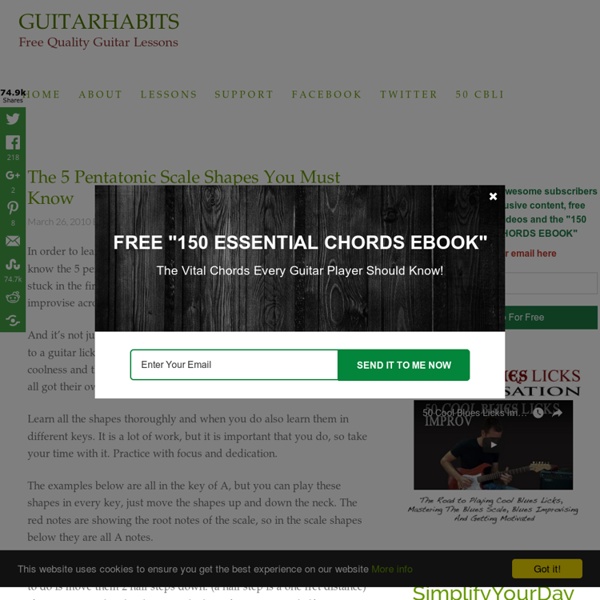JGuitar
JGuitar is a set of useful tools for players of stringed instruments. JGuitar's powerful chord and scale calculators replace traditional chord and scale dictionaries by providing dynamic calculation which works for any stringed instrument in any tuning. Users can alter the tunings of the instruments and even the instruments themselves. In fact, JGuitar was designed to work with any number of strings or frets. Our best of breed tools are gaining a reputation as the best on the web.
30+ Insanely Useful Websites for Guitarists
The guitar is an instrument that knows no genre and no boundaries--one of the reasons why it's arguably the world's most beloved instrument. Here are over 30 incredibly useful (and often entertaining) websites dedicated to the guitar and its admirers. Must-see sites 1.
Melodic Minor Scale Fingerings - Five Positions
The melodic minor scale is one of the most common scales that guitarists learn when they first begin their exploration of the linear aspect of the instrument. In this short primer to the melodic minor scale, you will learn how the scale is built, how to practice it from a technical standpoint, how to use it in an improvisational context and how to play the five basic fingerings for this scale across the guitar. Have a question or comment about this lesson?
Fingernails for Classical Guitar: How I Shape My Nails
By popular demand: a post on filing your nails for classical guitar. To be honest, I hate teaching this topic because no one files their nails in the same way. However, this might be of interest and a starting point for students so I thought I’d give it a good stab. Make sure to see the bottom of the post where I have videos by pros with the opposite shape!
16 Legendary Fingerpicking Patterns
For tabs see below. Fingerpicking style is a technique that is used in many famous and legendary songs over the years. The 16 examples in this post are a good source to learn the most common fingerpicking patterns you will ever come across. The fingerpicking patterns can be applied to almost every folk, pop, country or rock song. Try and figure out which pattern suits your favorite song.
The 13 scariest pieces of classical music for Halloween
Celebrate Halloween in macabre style with these bone-chilling masterpieces! Mussorgsky: Night on Bald Mountain The image of brooding, winged ghouls wreaking havoc on a mountain village under cover of night has terrified generations of young children in Walt Disney's Fantasia.
How to Play Bebop Scale Patterns for Guitar
One of the most widely used concepts in jazz improvisation; the Bebop Scale has long been a staple in the vocabulary of many of the genres great artists. Therefore it is an essential sound to get under your fingers when learning how to play bebop jazz guitar. When learning how to play jazz guitar, many players study this scale, they often practice it descending only, or with its related Dominant 7th Arpeggio ascending on the front end, but few people work this scale with patterns and phrases as they would the Pentatonic Scale or Major Scale. For this reason, I’ve compiled 21 different patterns that you can use to practice Bebop Scale fingerings on the guitar, most of which come from David Baker’s Bebop books, and all of which come from the jazz tradition and can be found in the solos of greats such as Wes Montgomery, Johnny Smith, Charlie Parker and many more. Before you dive in to these patterns, check out my article on Bebop Scale fingerings. Bebop Scale Patterns for Guitar
Learn The Guitar Fingerboard Thoroughly in 16 Days
Photo by John W. Tuggle If I have to name two things that took my guitar playing to the next level I would say music theory and memorizing the fingerboard. It made me understand the big picture. Combining music theory (understanding scales, modes, chord structure, improvising over chord progressions, etc, etc.) and knowing all the notes on the fingerboard will open up a whole new world. Guitar playing becomes more fun when you know what, when en where to play it on the fingerboard.



